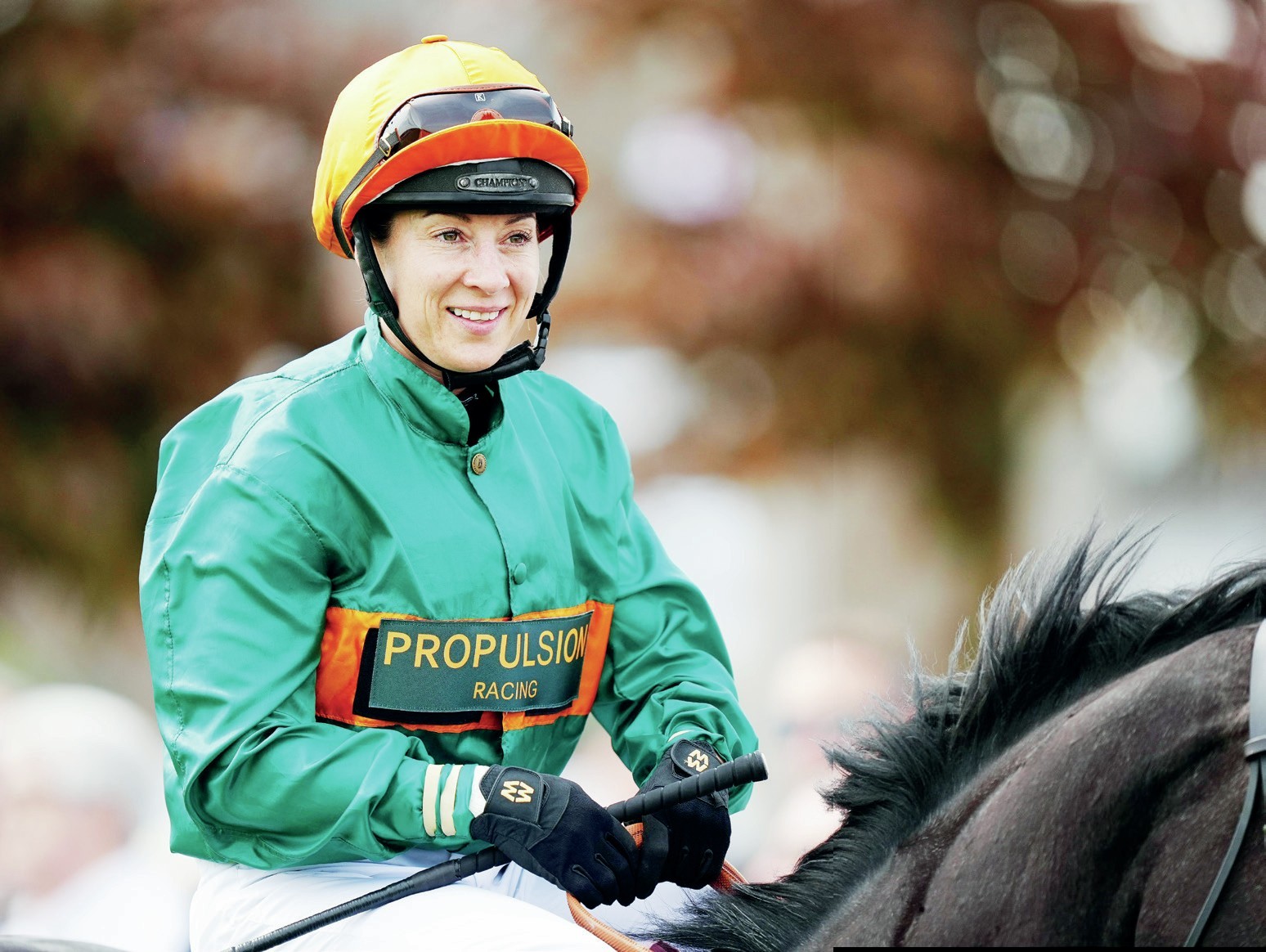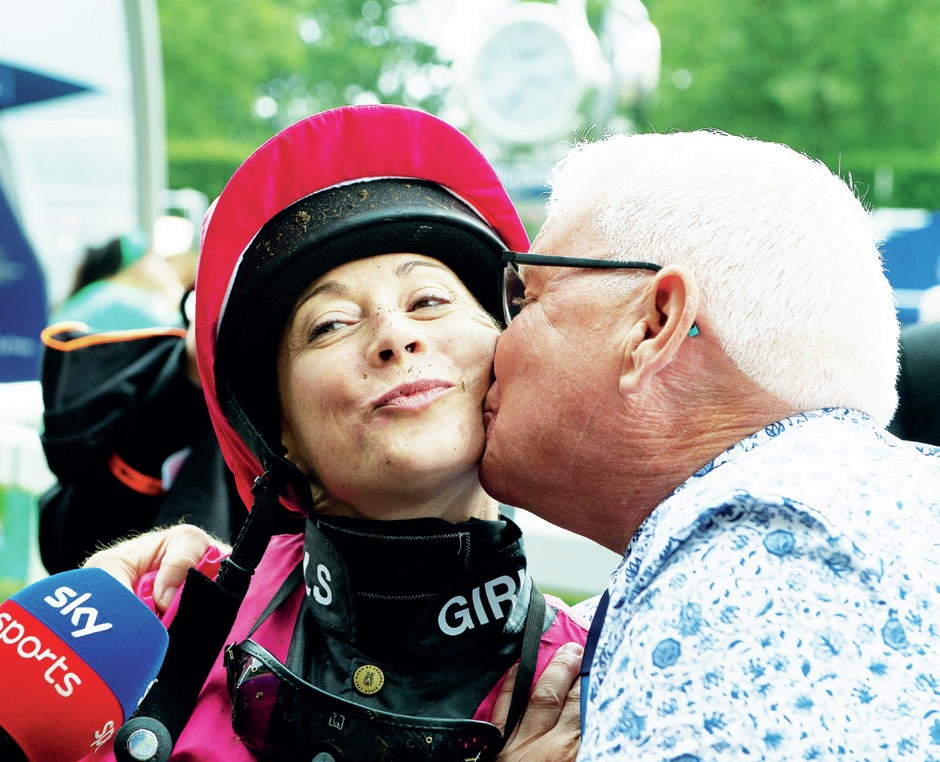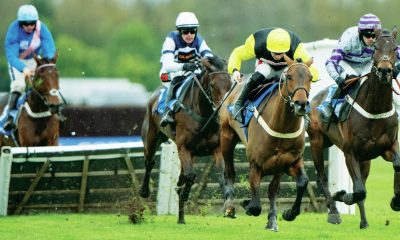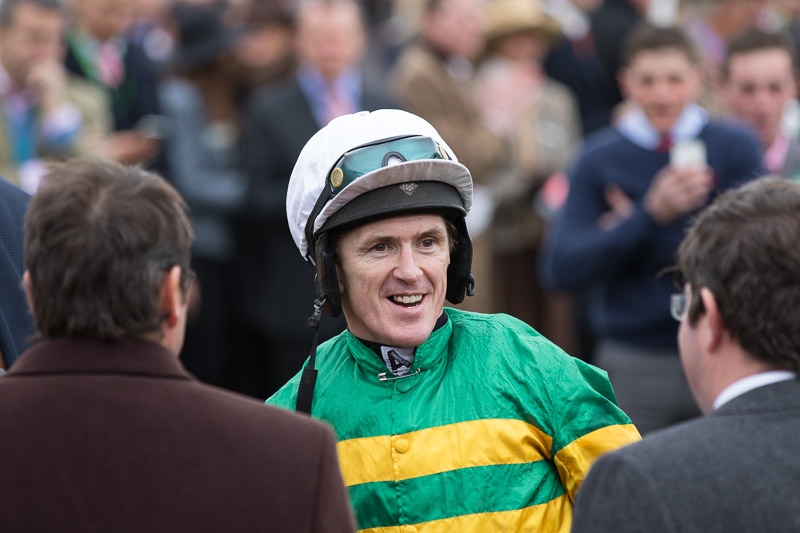
Nick Townsend finds Hayley Turner’s grand design has no room yet for retirement plans…
With Frankie Dettori departed our shores to ride in the US can there be any more cherished and captivating figure than Hayley Turner on our racecourses? And not merely because – bar a hiatus when she “retired” in 2015 only to find the urge to return irresistible – the boundary-busting jockey has been a permanent fixture for approaching a quarter of a century.
We meet during an evening meeting at Kempton just after she secures a comfortable victory on David Simcock’s Aim High. The race is no more than a class 5 handicap yet such is the affection in which she is held as she strides back to weigh in the jockey is hailed and even hugged by racegoersfor some of whom she had partnered winners over the years, Turner explainsand staff, too, all delighted for her.
I congratulate her, too, on a victory which takes her to just three shy of the 1,000 British winner mark. “To be honest, when I got to 1,000, with international wins (including in the U.S., where she won the Grade 1 Beverley D. Stakes at Arlington on Simcock’s I’m A Dreamer), that was my biggest relief,” Turner explains. “This would be an extra little bonus, and still nice to get it done first before the other girls do it. I know Hollie’s not far behind me.”
Hollie Doyle, a 27-year-old in a hurry, was on the 926 winner-mark at the time of writing, and closing fast. But she was amongst those who fully acknowledged Turner’s contribution to the progress of female jockeys when the latter reached her 1,000th winner overall in November last year, declaring: “She’s been incredible and paved the way.”
Through dedication, talent and graft, this intrepid pioneer, aged 41, has struck a powerful blow for women in the saddle this century, demonstrating to those that followed there were seams of gold to be mined in British racing.
I refer Turner back to 2005, a career-affirming year during which she had become joint champion apprentice, on 44 winners (with Saleem Golam). I had interviewed her at Nottingham racecourse, coincidentally two miles from her birthplace, for The Independent. She had just lost her claim, always a daunting enough period for any young rider but then even more so for a woman.

Turner was acutely aware that there remained a residue of prejudice against female riders. She told me at the time: “My agent…has said to me a few times that he knows which trainers not to bother ringing for rides because they won’t have a girl on.”
If there were questions in some quarters whether she would continue to receive support from trainers and owners, Turner answered them emphatically.
She was the first woman to reach 100 winners in a calendar year, in 2008, and, three years later, partnered two Group 1 winners in Dream Ahead, in the July Stakes at Newmarket and Margot Did in the Nunthorpe Stakes at York.
Yet, ask her about her career highlight, and while describing Dream Ahead’s victory as “magical”, Turner adds: “I always say it was my first winner without my claim, and that was on Rawdon, trained by Michael Bell, at Haydock.”
The date was September 23, 2005, the race a class 4 handicap, in which her 15 rival jockeys were mostly seasoned male professionals. “When I won, I thought: ‘Right, I’ll be able to make a living out of this!’” she recalls, with a smile.
She had qualified such an ambition to me all those years ago, with the words: “Like any of the lads …” And how true they have proved.
Turner adds: “Actually Michael Bell, (to whom she was apprentice and who was her guv’nor for 13 years) was obviously a huge part of that year. He gave me enough rides without overdoing it. I wasn’t as good as those (more senior jockeys), and I didn’t have my claim. I used that year to improve and strengthen up which I really think helped.”
There followed a decade in which the aforementioned triumphs and many more duelled with adversity in the form of injury, including a broken pelvis when her mount clipped heels and fell on her during the Park Hill Stakes at Doncaster in 2013 and a stalls accident on the Newmarket gallops when she suffered bruising inside her skull.
In 2015 she quit, explaining to me at the time: “My hunger’s always been there, but that seems to have gone” before adding that she had “massively exceeded her expectations”. Turner, the daughter of a riding instructor but with no family connection to racing, spoke of plans to develop a media career, something for which she is a natural. She still works for ITV.
Today, as she reflects on that period, I ask Turner how she would advise a youngster starting out today. “Obviously, work hard, but have a balance to your life,” she says. “If I could change anything I wish I’d maintained my diet better, fuelled my body better than I did. Mind-management is important, too, and I wish I’d picked up on that sooner. It got to the point that I got so frustrated I retired. Whereas if I’d been able to deal with it better…” She hesitates before adding: “I probably should just have had a year out other than retire.”
She expands on her rationale for the decision to quit. “I just wasn’t getting any opportunities,” she says. “I was riding absolute donkeys and I was working so hard riding out for everyone. I was in the gym, doing everything I could. I was just getting no results for such a long time. When I said I was going to retire it was such a big relief. It was like ‘I don’t have to keep trying any more. Oh, thank God’.”
But retirement clearly wasn’t the correct status for a woman with her drive. Turner, awarded an OBE for services to racing in 2016, nods in agreement. “I had a year out and the girls allowance (2kg4.4lbfor all female jockeys) was introduced in France. Probably, also after a year, I was keen to get back and I thought that was a great excuse to get my foot back in the door.”
By 2018, she had returned fully to British racing, with 44 winners, and the following year became the first woman since Gay Kelleway on Sprowston Boy in 1987, to ride a winner at Royal Ascot, with Thanks Be in the Sandringham Handicap – one of four victories she has enjoyed at the Royal meetings.
Since returning to the fray, Turner no longer applies the pressure on herself that she once did. “I’ve certainly learnt to mind-manage much better than I used to,” she says. “I went through the same sort of thing that younger jockeys go through now but they get a lot more guidance and support. They’ve got their own jockey coaches and their own gyms – I never had any of that. God, I do sound really old now!”
Turner adds: “There’s all kinds of disappointments. You think ‘oh, why aren’t I riding that?’ or (you’re told) ‘you can’t ride this’ and it wins. There’s injuries. You get disheartened quite easily. I think I’ve been through it all. I kind of know how to handle it now. But it’s just being able to cope with it. It’s all a learning curve, but what you go through makes you stronger.”
She adds: “I think I’ve also learnt to manage myself better fitness-wise. I think there was a time when I was so frustrated I was pushing myself too hard in the gym. It’s just like a fine balance, trying to keep enough energy to do the driving and the riding out, have conversations with people like you and owners. It’s a skill. I think I spent my first ten years on adrenalin and Red Bull.
“Now I have to watch what I eat a lot more. I can’t eat rubbish. Not because of my weight, but I need to fuel my body better than I have done because when you get older it’s not as forgiving, is it?”
She recalls times of “staying in and eating chicken nuggets with Red Bull.” You used to have that? I ask. “Oh, I would have done, yes. I’ve actually got coeliac disease (meaning adherence to a diet that does not contain barley, rye or wheat), so I have to be super-careful – now more so. Again, it was something I was never careful enough about, and now if I don’t stick to it I notice the difference massively.”
We return to her vision of the future for women riders. As their flag-bearer, at least in this century, I remind her that in 2015 she had told me, when we had discussed the lack of opportunities for women that “generally, the girls aren’t good enough”.
“But that’s ten years ago!” she retorts. “I even think the last four years has been huge. it’s getting there slowly. Next year it’s not going to be 50-50, but it will be (in time). It’s a slow process.”
She adds: “I do think there’s been a massive turning point over the last few years, with Hollie, and then you’ve got Saffie Osborne, Joanna Mason. I think they’re a better class than female jockeys used to be because they get the coaching and the fitness and the support. They’re getting a lot more help.”
And there’ll be a woman champion jockey? “Yep. A hundred per cent. Not this year because Oisin’s (Murphy) flying, but no reason why Hollie can’t do it, if not Saffie.”
Presumably, they must all look up to her? I suggest. “Maybe, but they’re really talented. When I started at their age I was nowhere near that good. Obviously, I’ve got experience, and I’ve done it now and I’ve proved it. When I was Saffie Osborne’s age I would not ride anything like her – I was no way nearly as good as she is.”
Her younger counterparts do seek her out for advice. “Not just about riding, but if they’re struggling with other stuff, I’m probably a bit of an expert on that sort of thing. They know they can talk to me – and a lot of them do.”
As for her own future, she insists that the canvas is blank and she has intention of picking up a brush of intent. Unlike some jockeys whose bodies cry out “enough!” of the kind of punishment Turner’s has received when they approach what we’ll politely call the veteran stage, hers has suffered no lasting ill-effects.
“I’m still doing alright and enjoying it,” says Turner whose principal stable for mounts is Simcock’s, but who also names Marcus Tregoning, Andrew Balding, Harry Eustace (whose Docklands she partnered into second place in The Queen Anne Stakes at Royal Ascot last month, following the pair’s win at the 2023 meeting) and, of course, Michael Bell amongst those who support her.
“This week was tough,” she admits. “I’m not going to lie. I actually added it up. From Sunday I’ve done 1,260 something miles. (From her Newmarket base, to Goodwood, Carlisle, Salisbury, Kempton and back). But I’d be whingeing if I was sat at home.”
So, you can’t project what will you be doing in, say, ten years’ time? “It’s not something I’ve really thought about because I’m just going to keep riding. I don’t even know what I’m doing on Sunday,” she says, laughing. “I’m not like that. My mindset is if something needs to change I’ll change it. And do something else.”

She continues: “Why retire? Rab Havlin is having a great year. And he’s in his fifties. It’s the horses that are the athletes. We’re strong enough, experienced enough and lucky enough to ride themas long as you keep fit, healthy and supple.” She adds: “I think the only difficult thing about being a bit older is that you’re not as fashionable. Rab has the support of John and Thady Gosden and that really helps. The same with Joe (Fanning) with Charlie Johnston.
“I don’t think that you’d want be at that stage, scraping round for dribs and drabs. I’ve been through that stage. For me, it’s so nice that David Simcock has given me my base amount of winners.”
All that Turner will predict for ten years hence is a significant increase in the ratio of women riders. “It’s been a very slow process but it’s certainly speeding up now,” she says. “I don’t think you’d interview me in ten years’ time and it’d be ‘oh, it’s still taking ages, isn’t it?’.”
She adds: “What I love is that , when ITV show footage of Rachael Blackmore winning at Cheltenham or Hollie winning at Ascot, it’s nothing to do with ‘what amazing girl jockeys’. It’s not even mentioned. That’s how it’s going to be more often.”
For exclusive stories and all the detailed Racing news you need, subscribe to the Racing Ahead website, digital edition, or magazine from as little as 8p a day.






















